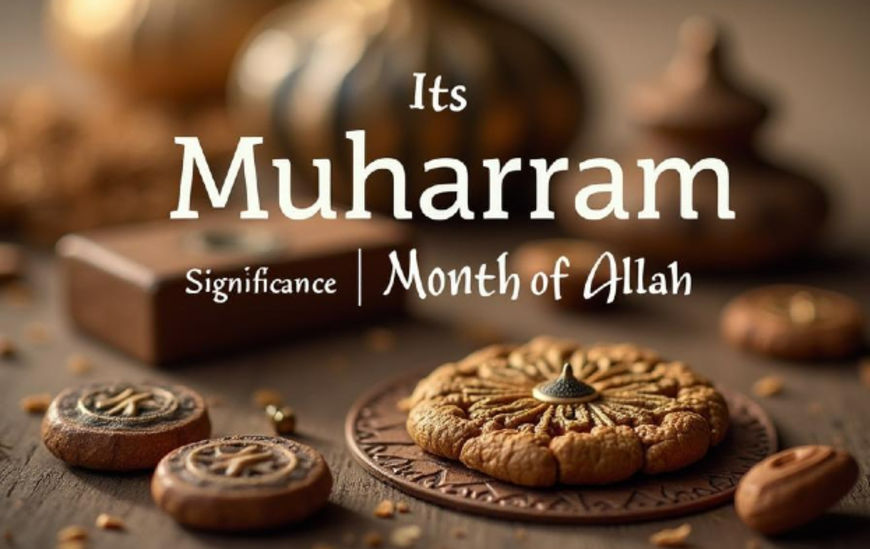
Muharram, the first month of the Islamic lunar calendar, is significant for Muslims worldwide. Known as "The Month of Allah," it is one of the four sacred months in Islam during which warfare is forbidden, and spiritual activities are encouraged. Muharram is a period of reflection, prayer, and fasting, marked by historical events that continue to resonate deeply within the Muslim community. This comprehensive guide delves into the meaning of Muharram, the virtues of fasting during this time, and how Muslims observe and celebrate the month.
What is Muharram, and When is it?

Muharram is the first month of the Islamic calendar and is considered a holy month, second only to Ramadan in terms of its sanctity. The term "Muharram" comes from the Arabic root word "haram," meaning "forbidden." This signifies that fighting and conflict are prohibited during this month, emphasizing peace and introspection. Muharram begins with the sighting of the new moon and lasts for 29 or 30 days, depending on the lunar cycle.
The most notable day within Muharram is the 10th, known as Ashura. This day is particularly significant for its historical and spiritual connotations, which include both fasting traditions and commemorations of key events in Islamic history.
The Historical Significance of Muharram

Muharram is steeped in history and tradition, with events that have shaped Islamic culture and beliefs. Two key events are particularly remembered during this month:
-
The Day of Ashura and the Prophet Moses (Musa)
Ashura marks the day when Prophet Moses (Musa) and the Israelites were saved from the tyranny of Pharaoh by the parting of the Red Sea. This miraculous event is a testament to Allah's mercy and power. In gratitude for this deliverance, Prophet Moses fasted on this day. The Prophet Muhammad (peace be upon him) continued this tradition, encouraging Muslims to fast on Ashura as an act of gratitude and faith. -
The Tragedy of Karbala
The most poignant event associated with Muharram is the martyrdom of Imam Hussain, the grandson of the Prophet Muhammad, in the Battle of Karbala in 680 AD. Imam Hussain and his followers stood against the oppressive Umayyad caliphate, fighting for justice and truth. The tragedy of Karbala is especially significant in Shia Islam, where it is remembered with deep mourning and reverence. It symbolizes the eternal struggle against oppression and injustice, and the sacrifices made by Imam Hussain and his companions are honored through various rituals and commemorations.
Fasting in Muharram
Fasting during Muharram, particularly on the day of Ashura, is a highly recommended practice in Islam. While not obligatory like the fasting during Ramadan, it is encouraged as a means of seeking spiritual rewards and closeness to Allah.
Fasting on the 9th and 10th of Muharram
To distinguish the Islamic practice from other religious traditions, the Prophet Muhammad advised fasting on the 9th and 10th of Muharram, or the 10th and 11th. This practice underscores the importance of this period in Islamic spirituality and helps cultivate discipline and mindfulness. Fasting on these days is seen as a way to emulate the Prophet's actions and express gratitude for Allah's blessings.
Virtues of Fasting on Ashura
Fasting on Ashura holds special virtues. According to Islamic tradition, fasting on this day expiates the minor sins of the previous year. The Prophet Muhammad is reported to have said, "For fasting the day of Ashura, I hope that Allah will accept it as expiation for the year that went before" (Sahih Muslim). This hadith highlights the spiritual significance and rewards associated with fasting on Ashura, making it a day of repentance and purification.
How is Muharram Celebrated?

Muharram is observed differently across various Islamic traditions, reflecting the diversity within the Muslim community. While the month is generally marked by increased devotion, prayer, and fasting, specific customs can vary:
1. Prayer and Reflection
Muslims engage in extra prayers and reflection during Muharram. The recitation of the Quran, making dua (supplication), and seeking forgiveness are common practices. The use of a rosary, known as a "misbaha" or "tasbih," is also prevalent during this time. The rosary is used to count the recitations of specific prayers and phrases, such as "Subhanallah" (Glory be to Allah), "Alhamdulillah" (Praise be to Allah), and "Allahu Akbar" (Allah is the Greatest). This practice aids in maintaining focus and devotion, helping believers to deepen their spiritual connection. Many communities hold gatherings to discuss the significance of the month and the lessons from the events of Karbala, promoting unity and spiritual growth.
2. Charity and Good Deeds
Acts of charity and kindness are emphasized during Muharram. Muslims are encouraged to give in charity, help the needy, and perform good deeds as a way of honoring the sacrifices of Imam Hussain and his followers. This practice reinforces the values of compassion and empathy, central to Islamic teachings.
3. Mourning Rituals
In Shia communities, the first ten days of Muharram are observed with deep mourning, culminating in Ashura. Rituals include Majlis (gatherings to recount the events of Karbala), recitations of elegies (Nauhas), and processions. Participants may also engage in acts of self-flagellation, chest beating, or wearing black as expressions of sorrow and solidarity with the suffering of Imam Hussain. These rituals serve as a reminder of the principles of justice and the sacrifices made in its pursuit.
4. Public Processions
In many parts of the world, Muharram is marked by public processions, particularly on the day of Ashura. These processions often involve reenactments of the Battle of Karbala, chants, and recitations. They serve as a public expression of grief and a means of educating others about the historical events of Muharram.
Muharram's Contemporary Relevance
.jpg)
The lessons of Muharram, particularly the story of Karbala, resonate beyond the historical and religious context. They underscore universal values such as standing against oppression, seeking justice, and upholding moral integrity. In today's world, where issues of justice and human rights are at the forefront, the message of Muharram remains relevant and inspiring.
Muharram is not just a time for reflection on the past but also an opportunity for self-assessment and commitment to justice and righteousness. It calls on believers to embody these values in their daily lives and contribute to a more just and compassionate society.
Muharram, "The Month of Allah," is a sacred period of reflection, prayer, and fasting for Muslims worldwide. Whether through fasting on the day of Ashura, engaging in charitable acts, or participating in mourning rituals, Muslims seek to draw closer to Allah and honor the memory of key historical events. The stories and lessons from Muharram, especially the stand of Imam Hussain at Karbala, offer timeless guidance on the values of justice, sacrifice, and moral integrity. As we observe this holy month, let us strive to internalize these lessons and apply them in our lives, fostering a spirit of peace, compassion, and righteousness.




 Jewelry
Jewelry Silver amber jewelry
Silver amber jewelry Amber pictures
Amber pictures Souvenirs
Souvenirs